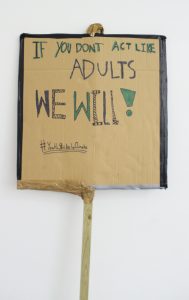
People’s History Museum (PHM) is urgently seeking donations to support its contemporary collecting work as the museum responds to the unprecedented events of 2020 against a challenging backdrop for the cultural sector. The last few months represent important chapters in the history of people taking action which, as the national museum of democracy, it wants to ensure it can reflect in its collections. However, to do all of the contemporary collecting work that it believes is necessary, it is asking people to back its dedicated fundraiser; Collective Action.
PHM’s collections tell of the struggle for universal suffrage, votes for women, workers’ rights, the formation of a national healthcare service (NHS), equality for all – and much more. Contemporary collecting contributes a huge amount in how these stories continue to be explored and told. The museum’s plans for contemporary collecting in 2020 have escalated significantly with the history making events that have unfolded in this year; so too have the financial challenges that are being confronted as a consequence of Covid-19.
Katy Ashton, Director of People’s History Museum says, “There is such a huge amount happening at the moment that we want people now and in the future to be able to learn from, but we also face the reality of the financial pressures caused by Covid-19 with the museum’s income and resources considerably affected. We want to be able to radically step up our contemporary collecting in a year that will be looked back upon as a historical milestone for the Black Lives Matter movement and the impact of Covid-19, and PHM needs your help to do this. We are challenged by the present, but very much have our focus and energy set to the future and what we can collectively achieve.”
In a pre-Covid world, People’s History Museum’s contemporary collecting was focused on migration, disabled people’s rights and environmental activism, serving to reflect its current and upcoming programme themes. With the unprecedented impact of events in 2020, in particular the Black Lives Matter movement and Covid-19, the museum must respond by increasing the level of contemporary collecting it carries out to ensure it is doing as much as it can to champion and collect ideas worth fighting for. The growing contemporary collection already features items inspired by the museum’s 2019 headline theme of protest, which were gathered through the creation of the Protest Lab; an innovative gallery space at the museum to which people submitted items representing their campaigns of protest. Also featured are Fridays for Future and the story of Brexit; from pre-referendum campaigning to demonstrations both for and against Brexit that have followed.
Sam Jenkins, Collections Officer at People’s History Museum, says, “Contemporary collecting is incredibly important to us, as a museum that is as much about the present and future of democracy, as it is about stories from the past. Our contemporary collecting programme helps us to fill gaps in our current collections, including the stories of those historically underrepresented by museums.”
Help make history
People’s History Museum urgently needs your help to capture the events of these times through contemporary collecting, to digitise and share these collections, and to plan future work with communities that draws influence from what’s happened. To directly support these efforts a dedicated campaign has been established, Collective Action, to which you can support here: virginmoneygiving.com/fund/PHMcollectiveaction.
To support the ongoing work of the national museum of democracy and all that it does to educate, inspire, encourage and engage people with the power of democracy you can also Join the Radicals, sponsoring a Radical of your choice or becoming a Supporter from as little as £2.50 a month: phm.org.uk/support-us/
The power of PHM’s work
The influence, inspiration, and vision of People’s History Museum’s work is captured in its 2020 Impact Report, which marks ten years of ideas worth fighting for at the national museum of democracy’s home in central Manchester. You can read the Impact Report and PHM’s story and timeline.
You can find out more about PHM’s collections here: https://phm.org.uk/collections/
PHM is closed until Tuesday 1 September 2020, but you can stay in touch and enjoy the online activities by visiting phm.org.uk, signing up to the e-newsletter, subscribing to the blog, or following the museum on Twitter @PHMMcr, Facebook @PHMMcr, and Instagram @phmmcr.


Making contemporary collections count
One of People’s History Museum’s recent acquisitions is the ‘There Is No Planet B’ placard, which was collected from the very first Youth Climate Strike in Manchester in 2019. The influential and creative role that this simple placard has fulfilled demonstrates how important the pieces acquired through contemporary collecting are to the national museum of democracy.
ENDS
For further information please contact Fido PR:
laura.sullivan@fidopr.co.uk / clare.short@fidopr.co.uk 0161 832 3588
Images: https://www.dropbox.com/sh/03dyc9dvj5bdeqz/AAB720mtdE2kR1SDc7XeRSrka?dl=0
About People’s History Museum (PHM)
People’s History Museum (PHM) in Manchester is the national museum of democracy, telling the story of its development in Britain: past, present, and future. The museum provides opportunities for all people to learn about, be inspired by and get involved in ideas worth fighting for; ideas such as equality, social justice, co-operation, and a fair world for all. PHM offers a powerful programme with annual themes; 2018 looked at representation and commemorated 100 years since the first women and all men won the right to vote in Britain, in 2019 the focus was on protest to mark the bicentenary of the Peterloo Massacre in Manchester, the programme for 2020/2021 is on the theme of migration and 2022 will explore disabled people’s rights and activism. Previous winner of Kids in Museums Family Friendly Museum Award.
About Arts Council England (ACE)
PHM is an Arts Council England (ACE) National Portfolio Organisation (NPO). The work of PHM is supported using public funding by ACE, the national development body for arts and culture across England, working to enrich people’s lives. ACE support a range of activities across the arts, museums and libraries – from theatre to visual art, reading to dance, music to literature, and crafts to collections. Great art and culture inspires us, brings us together and teaches us about ourselves and the world around us. In short, it makes life better. Between 2018 and 2022, ACE will invest £1.45 billion of public money from government and an estimated £860 million from The National Lottery to help create these experiences for as many people as possible across the country. artscouncil.org.uk.